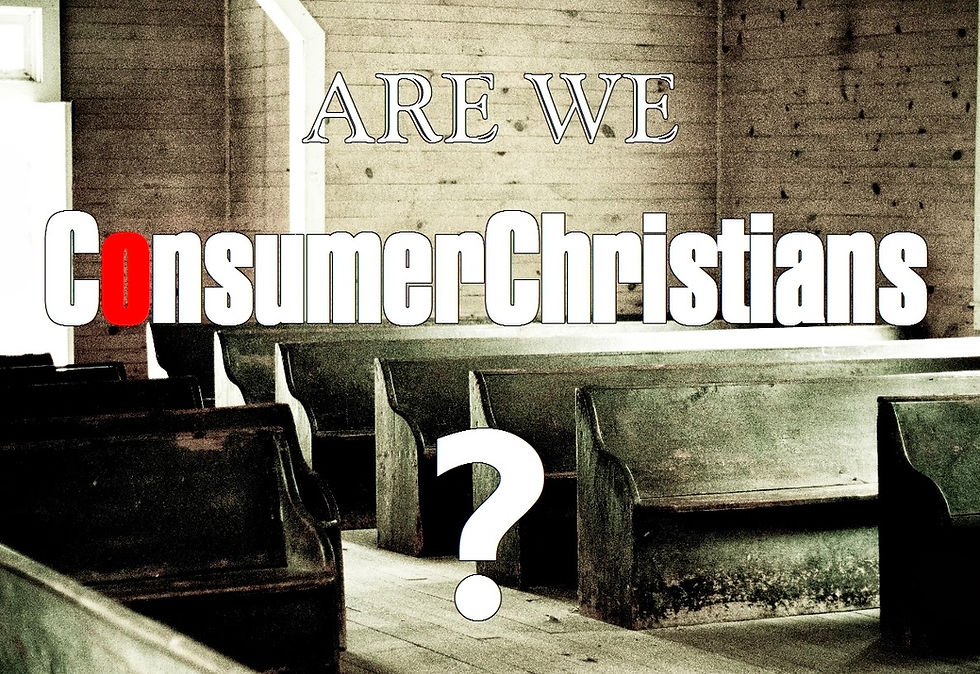Is the Church Being Consumed With Consumerism?
- David Schrader, PhD., National Pastor
- Nov 13, 2018
- 8 min read

The influence of culture on how people view God and their devotion to Him has been a danger to every generation. Albert Mohler, in his book, Culture Shift, mentions how Aristotle once described the challenge of a culture like the problem of a fish in water. Knowing nothing but life in the water, the fish never realizes it is wet. Mohler believes this describes many Christians today—they do not realize that living in this present world they have become wet with the influence of today’s culture.[1]
Mohler further adds, “We are swimming in one of the most complex and challenging contexts ever experienced by the Christian church. Every day brings a confrontation with cultural messages, controversies, and products. We are bombarded with advertisements, entertainments, and the chatter of the culture all around us. We are Aristotle’s fish.”[2]
Every church age must discern the impact of culture upon its mission and ministry. The Barna Group notes that 71% of evangelicals are most likely to agree that life is getting more complex. This may suggest that evangelicals are sensing a growing disparity between the rhythms and values of their faith and the demands of a rapidly changing culture. [3]
The church has not escaped the engulfing effects of the sociological and ecclesiastical shifts of the last 40-50 years. It now finds itself enmeshed in a consumeristic culture. Consumerism is the pursuit of the 'good life'. While consumers can have a positive impact on the economic viability of a nation, consumerism can be a selfish and frivolous pursuit of products and brands that are meant to satisfy us and bring happiness.
In 1955, economist Victor Lebow stated:
“Our enormously productive economy demands that we make consumption our way of life, that we convert the buying and use of goods into rituals, that we seek our spiritual satisfaction and our ego satisfaction in consumption. We need things consumed, burned up, worn out, replaced and discarded at an ever-increasing rate. [4]
How Has Consumerism Affected the Church?
Today’s church attender wants the Christian faith packaged as something which is “relevant” and many churches and pastors have been eager to accommodate. They do everything they possibly can to present an attractive product that can be desired, experienced and consumed. Unfortunately, such an emphasis has not been without its ill effects. Consumers’ insatiable appetites often demoralize pastors as they face an ever-demanding audience that wants them to produce a “quality product” instead of asking them to be the shepherds they are called to be.
Make no mistake, consumerism’s parallel with religion is not an accidental one. Consumerism is ubiquitous and ephemeral. It is arguably the religion of the late twentieth century.” [5] David Wells points out that American evangelicals are allowing consumerism to reshape their faith so that God becomes the author of our satisfaction and the God of mercy becomes a god at our mercy!” [6]
The North American evangelical church has been consumed by consumerism. It is a powerful ideology that contributes to the frequency of pastoral frustration and resignations. Consumeristic thinking in the church reveals a preponderance of unhealthy attitudes such as, “What’s in for me” or “What bang is there for my buck?” "If you can't make me happy, I will go to the next church down the street".
Win Arn, a leading church growth consultant, surveyed a thousand churches and their members. He discovered that 89% of them said that the number one purpose for the church’s existence is to “take care of my needs and those of my family.” Only 11% said, “The purpose of the church is to win the world for Jesus Christ.” For many, the role of the pastor is simply to keep the sheep that are already in the "pen" happy and not lose too many of them. [7] We clearly have a culture absorbed with themselves. To say we are a “selfie” generation is an understatement.
Consumerism espouses a value system that encourages huge levels of personal debt and a throw-away mentality. This makes it increasingly more difficult for pastors to receive an appropriate wage and for ministry initiatives to take place, because people are consuming more for themselves and giving less to the church and its ministries. When I first started in ministry, very few couples took trips to the Caribbean islands. Now it is commonplace to see people needing their “winter breaks” whether they can afford it or not. It is also not uncommon to see people spending exorbitant amounts of money on their weddings. Statistics show the average cost of a wedding in Canada for 2017, was $42,400.56. [8]
Consumerism can negatively impact the church. When the church is just one more product to buy or leave on the shelf, then marketing, not theology, becomes the driving force in the life of the church. If you add to this that 91% of America’s evangelicals and half of the senior pastors in America believe that “Americans are becoming more hostile and negative towards Christianity”,[9] you will understand why churches are doing everything possible to market themselves into a softer image. But at what price? Can a church’s integrity suffer in the process? I not only think it could, I believe it already has.
Anthony Robinson sees congregations that honor the “priesthood of all believers” as something that has turned into the “congregations of all consumers.” [10] The church has become a place where the clergy, or “staff,” and a core of lay leaders produce some product called “ministry,” which is consumed by the congregation. [11] Ed Stetzer warns, “The incessant demands of a consumer congregation cause irreparable damage to those who lead such congregations.” [12]
Incessant demands and expectations from today’s church consumer, along with a pastor’s inability to meet those demands, creates an impossible no-win situation for pastors. An appropriate way to envision the church should stress that all Christians are called to ministry; and that pastors are to, “equip those people for . . . ministry” (Eph. 4:12). This is the ideal picture of the church. Everyone should take to heart Paul’s cure for consumerism– “Do nothing out of selfish ambition or vain conceit, but in humility consider others better than yourselves. Each of you should look not only to your own interests, but also to the interests of others”. (Phil. 2:3-4)
When churches are filled with people who are caught up in consumerism, it will always function in a very unhealthy manner. Robinson points out, “When only a few in ministry create a commodity that is consumed by the many . . . . an unhealthy dynamic is created between those who provide and those who consume.” [13]
John Micklethwait and Adrian Wooldridge in their book, God is Back, went so far as to describe the state of the North American church as the “Disneyfication of God” or “Christianity Lite”—a bland and sanitized faith that is about as dramatic as the average shopping mall.” [14]
When church consumers envision the Pastor’s role as one of entertaining and accommodating them, then do not be surprised if that pastor shows signs of suffering from role confusion. God didn’t call them to be entertainers and soft peddlers of the truth. He called them to be shepherds that would “use the scriptures for teaching, for showing people what is wrong in their lives, for correcting faults, and for teaching them how to live right” (2 Tim. 3:16).
G. Jeffrey MacDonald addressed the fickleness of today’s church consumers and their effect on the clergy in a New York Times article entitled, Congregations Gone Wild,
As religion becomes a consumer experience, the clergy become more unhappy and unhealthy . . . . Americans now sample, dabble and move on when a religious leader fails to satisfy for any reason . . . . In this transformation, clergy have seen their job descriptions rewritten. They are no longer expected to offer moral counsel in pastoral care sessions or to deliver sermons that make the comfortable uneasy.[15]
MacDonald’s observations are sad and painfully true. In churches afflicted with consumeristic thinking, the problem has become all too obvious. We have learned to not only place value but to expect value from everything we consume. These expectations are making pastor's lives difficult.
When we contemplate our involvement in the church from a consumer mindset, seeking to find value, rather than seeking to serve, Christianity can easily become just one more brand that we will consume. When Christianity is just another “brand” to be consumed and disposed of, it will have little transforming power over people’s lives and the direction they take.
Christians must be taught to “not to conform any longer to the pattern of this world but to be transformed by the renewing of their mind” (see Rom. 12:2). Christian leaders must be aware that without a transformed mind, cultural influences, like consumerism, will continue to be a problem for churches and their leadership.
If people in our churches are just consuming to live, then they are following a natural biological process that all living beings need to do in order to survive. On the other hand, if they are living to consume, then they have an unhealthy fixation on the things of this world. Let me explain. One day a man asked Jesus if he could get his brother to divide the family property their father left them. It seemed like a reasonable enough request. But Jesus responded with these words, “Be careful and guard against all kinds of greed. Life is not measured by how much one owns” (Luke 12:15). This is sound advice to those who may be living in such a way as to consume all they can get out of this world.
The Apostle John gives us a very healthy perspective: “Do not love this world nor the things it offers you, for when you love the world, you do not have the love of the Father in you. For the world offers only a craving for physical pleasure, a craving for everything we see, and pride in our achievements and possessions. These are not from the Father but are from this world. And this world is fading away, along with everything that people crave. But anyone who does what pleases God will live forever (1 Jn. 2:15-17).
Make it your desire today to want less of this world and more of God. Don't be consumed by consumerism. Be consumed with God and his ways. Make God your desire as He was King David’s, “As a deer thirsts for streams of water, so I thirst for you, God. I thirst for the living God” (Psalm 42:1-2).
[1] R. Albert Mohler, Culture Shift(Colorado Springs, CO: Multnomah Books, 2008), xv.
[2] Ibid.
[3] David Kinnaman, “Three Trends Redefining the Information Age,” The Barna Group, http://https://www.barna.org/barna-update/culture/641-3-trends-redefining-the-information-age (accessed January 23, 2014).
[4] Lebow, Victor. http://hundredgoals.files.wordpress.com/2009/05/journal-of-retailing.pdf
[5] Steven Miles, Consumerism—as a Way of Life, 4th ed. (London: Sage Publications, 2006), 1.
[6] David Wells, God in the Wasteland(Leicester, UK: Inter Varsity Press, 1994), 114.
[7] As quoted in Rick Warren, Purpose Driven Church, Grand Rapids, Zondervan, 1985, 52.
[8] https://www.statista.com/statistics/807306/cost-of-wedding-in-canada/
[9] “A New Generation Expresses its Skepticism and Frustration with Christianity,” The Barna Group, http://https://www.barna.org/barna-update/millennials/94-a-new-generation-expresses-its-skepticism-and-frustration-with-christianity (accessed January 23, 2014).
[10] Anthony B. Robinson, “This Thing Called Church: What Is It Really?” Alban Institute 2006, http://www.alban.org/conversation.aspx?id=2098 (accessed August 27, 2012).
[11] Ibid.
[12] Ed Stetzer, “Can Christian Consumers Ruin Pastors?” Church Leaders.com, http://www.churchleaders.com/pastors/pastor-articles/145929-can-christian-consumers-ruin-pastors.html?utm_source=newsletter&utm_medium=email&utm_campaign=Daily-Update (accessed September 23, 2012).
[13] Anthony B. Robinson, “This Thing Called Church: What Is It Really?” Alban Institute 2006, http://www.alban.org/conversation.aspx?id=2098
[14] John Micklethwait and Adrian Wooldridge, God Is Back(New York, NY: Penguin Press, 2009), 189.
[15] G. Jeffery MacDonald, “Congregations Gone Wild,” New York Times, August 7, 2010. http://www.nytimes.com/2010/08/08/opinion/08macdonald.html?_r=2&hp\).





















Comments